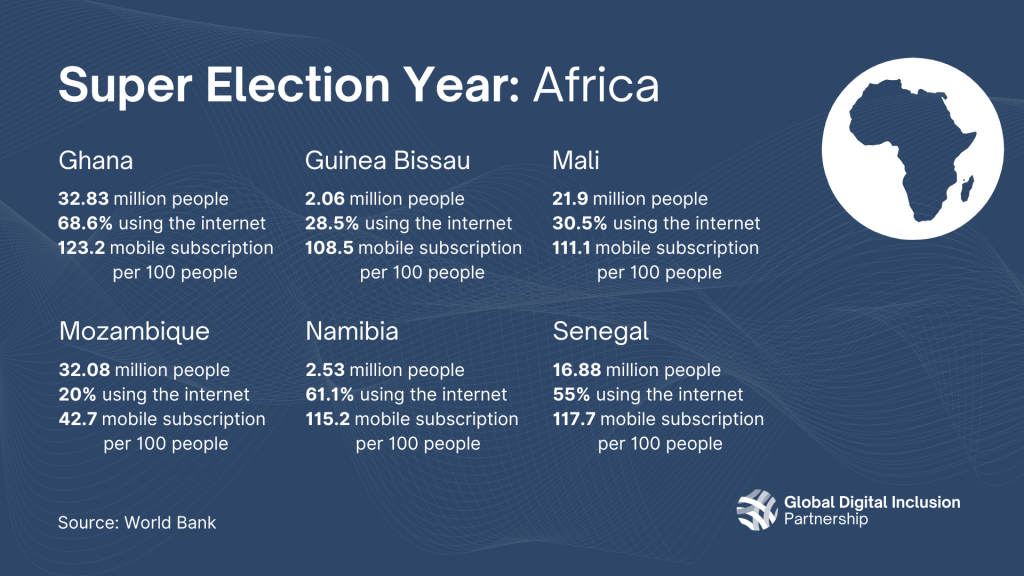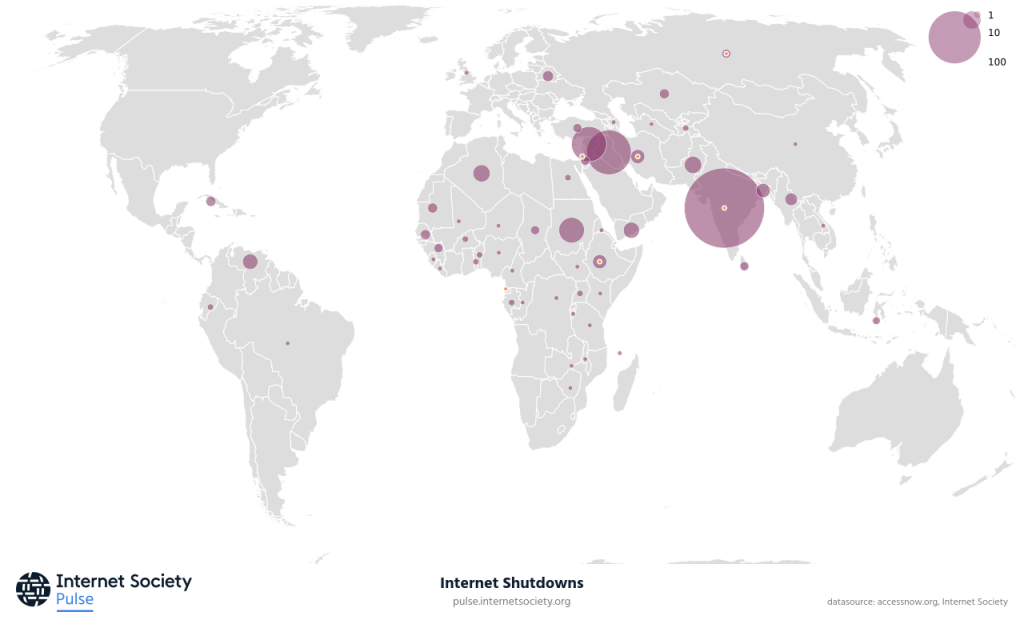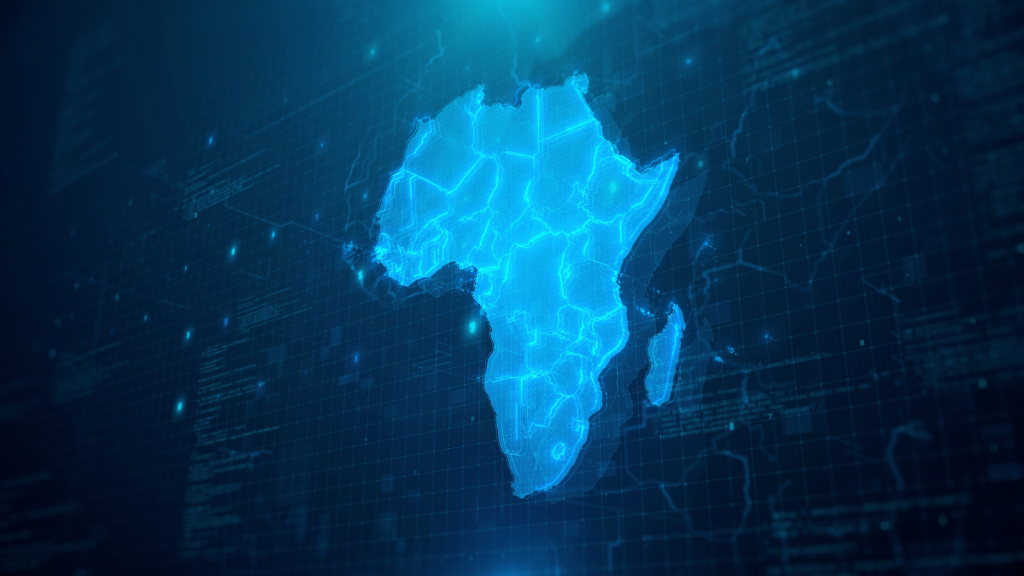This post was written by Jaqueline Pateguana, GDIP Regional Lead for Africa.
With several presidential elections scheduled to take place and the recent adoption of the Pact for the Future and Global Digital Compact at the UN General Assembly, the tail end of 2024 has the potential to be a pivotal period for digital rights and inclusion in Africa, offering significant potential for groundbreaking developments.
Dubbed a “Super Election Year”, by December 2024, the world will have witnessed elections in 50 countries, including 19 in Africa. In the second half of the year, Sub-Saharan Africa alone will host more than six presidential or national elections, with Ghana, Guinea Bissau, Mozambique, and Namibia among the nations poised for change. Nearly fifty years after gaining independence, these elections represent more than mere democratic processes; they are potent catalysts for progress and transformation and will be critical in improving the lives of millions of Africans across the continent.

Adding to this momentum, the recently concluded Summit of the Future culminated in a global consensus on building a more inclusive, secure, and human-centered digital future. Central to the Summit’s accomplishments was the approval of the Global Digital Compact (GDC), a visionary document that charts the course for advancing digital rights. Together, the electoral milestones and the GDC represent a turning point in the global push for enhanced digital rights and inclusion on the continent.
How critical are digital rights and inclusion for the 2024 elections?
Digital rights and inclusion are becoming prominent topics for civil society and governments across Africa, reflecting their integral role in modern citizenship rights. As societies increasingly rely on digital platforms for communication, governance, and access to information, promoting and protecting these rights has become essential.
On the demand side, we are witnessing a historic increase in civil society’s interest and engagement in topics related to the availability, affordability, readiness, and reliance on digital products and services. Youth, women, and marginalized groups demand full participation in the digital world, seeking access to the tools and opportunities it offers.
Earlier this year, students in Mozambique protested a decree that more than doubled telecom service costs. Following days of protests on the streets and hours of negotiations with consumer rights groups, the communications regulatory authority suspended the resolution until more studies on the cost of services were concluded. In the same period, the South African civil organization, ‘Friends of a Free Internet’ protested against high mobile data costs, increasing public awareness of the importance of affordable data plans and devices.
Elsewhere, push-backs against internet shutdowns in countries including Ethiopia, Zimbabwe, and Sudan reiterate how citizens everywhere on the continent are mobilizing themselves to safeguard their digital rights. Through the #KeepItOn Election Watch campaign, citizens of the countries mentioned above actively participated in both online and offline efforts to reduce these shutdowns, which pose a significant threat to human rights in cyberspace. Complemented by the rise in mobilization by digital rights organizations, such as GDIP partners Paradigm Initiative and CIPESA, civil society is mobilizing itself across the continent to keep citizens informed about the importance of digital freedoms, including freedom of expression, access to information, and the right to privacy and security online.
The results of civil society’s active and coordinated participation in advocating digital rights are mixed. While 2021 saw 19 internet shutdowns across 12 African countries, the number dropped to nine shutdowns in seven countries by 2022. However, 2023 witnessed a resurgence, with 17 shutdowns across nine countries. Although the spike in 2023 raises concerns about the use of shutdowns as tools of control and suppression of human rights, the overall trend over the three years suggests some progress, highlighting the critical role of civil society in prioritizing digital rights during protests, political turmoil, election campaigns, and beyond. In addition, the recent ECOWAS court ruling against the government of Togo, in a case brought forth by Amnesty International, affirmed that internet shutdowns violate “freedom of expression.”

A second significant development is that governments are becoming increasingly responsive to digital rights and inclusion concerns. In February 2024, the Association of African Election Authorities (AAEA) introduced the Principles and Guidelines for the Use of Digital and Social Media in Elections in Africa, a tool designed to enhance the capacities of electoral management boards in leveraging digital technologies while combating misinformation, disinformation, and privacy threats that could manipulate public opinion and impact electoral outcomes.
Although the call for this non-binding instrument began in 2020, it took two years to establish a technical working group and another two years of consultations and development to align the guidelines with international human rights laws and standards, such as the Universal Declaration of Human Rights, the African Union Convention on Cyber Security and Personal Data Protection, and the ACHPR Resolution on the Protection of Women Against Digital Violence in Africa. These guidelines were developed to address the normative gap regarding the use of digital and social media in electoral processes.
In addition to demonstrating civil society engagement and concern, the above examples demonstrate that digital rights and inclusion are closely interlinked with democratic participation. Enhanced digital governance is imperative for bridging the digital divide, ensuring that everyone, regardless of socioeconomic status, has access to the tools and opportunities provided by digital tools and services. Digital inclusion empowers marginalized groups by giving them access to education, healthcare, job opportunities, and vital information, which can improve their quality of life and reduce poverty. Additionally, involving these communities in digital development promotes social equity, enabling them to participate more fully in economic and democratic processes. This participation not only strengthens the fabric of society but also drives sustainable development by ensuring that no group is left behind in the digital age.
The Global Digital Compact
On the international stage, the adoption of the GDC is a monumental event focusing on promoting digital rights and inclusion in Africa. To accelerate progress on global commitments and address emerging challenges, the United Nations hosted the Summit of the Future at its headquarters in New York in September 2024. A key outcome of it is the endorsement of the action-oriented Pact for the Future, which includes the Global Digital Compact (GDC), an inclusive framework aimed at fostering global cooperation to address digital challenges like universal internet access, data privacy protection, and safeguarding digital rights.
For Africa, the GDC is particularly relevant as it confronts issues such as the digital divide, limited internet penetration, and the need for stronger digital governance. The GDC offers African nations a platform to address their unique digital rights and inclusion challenges. By participating in this global initiative, African countries can collaborate on creating policies that bridge the digital divide while tackling cybersecurity, data protection, and internet governance tailored to their specific contexts. The GDC aims to support African countries in advancing their digital development agendas, ensuring that digital transformation benefits all citizens, especially marginalized communities.

While the GDC addresses gender equality, highlighting the need for women’s full and equal participation in the digital space and calling for the elimination of gender-based violence online, its standalone principle on gender falls short of the transformative change needed. It lacks the urgency required to meet ambitious targets, such as the G20 commitment to cut the gender digital divide in half by 2030. More actionable steps are necessary to drive meaningful progress.
On the margins of the Summit, the Women in Digital Economy Fund (WiDEF) hosted a side event that ignited essential discussions on the gender digital divide. The event also marked the launch of WiDEF’s inaugural report, The Time is Now: Policy Actions to Close the Gender Digital Divide, which offers concrete steps to address this critical issue.
The next steps are on us
As we move forward, it is crucial that we — citizens, policymakers, and civil society organizations — remain engaged and vigilant at national, regional, and international levels to ensure that digital rights and inclusion remain a priority in Africa’s digital future. We encourage you to support and join local organizations, including Paradigm Initiative, CIPESA, and other GDIP partners working tirelessly to bridge the digital divide. We invite you to attend our upcoming advocacy sessions at MWC Kigali 2024 and Africa Tech Festival 2024 to help drive these efforts forward.
By actively participating in advocacy efforts, holding leaders accountable, and promoting the importance of digital inclusion, we can help shape a future where digital transformation benefits all citizens, leaving no one behind in the digital age.
About GDIP
The Global Digital Inclusion Partnership is a coalition of public, private, and civil society organizations working to bring internet connectivity to the global majority and ensure everyone is meaningfully connected by 2030. GDIP advances digital opportunities to empower and support people’s lives and agency, leading to inclusive digital societies.